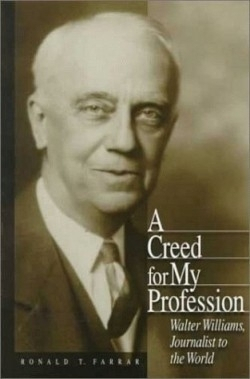A Creed for My Profession
Walter Williams Journalist to the World
Paying tribute to Walter Williams, dean of the world’s first School of Journalism at the University of Missouri at Columbia, Arthur Hays Sulzberger of the New York Times said Williams “found journalism a trade and helped to make it a profession.”
It is interesting and heartening to hear that legacy exalted, as it is in Farrar’s thorough account of a man who never attended college, but who rose to the heights of a university president. Journalists are now frequently criticized as too elite, far more concerned with their next guest commentary appearance than serving as a watchdog or guardian for the public good. For a practicing journalist, Farrar’s work is a reminder of the ideals, last heard, most likely years ago in an institution like the one Williams founded, through perseverance and patience over naysayers and skeptics.
A succinct introduction tantalizes readers with a taste of the beliefs and passions Williams held about journalism and the role it could play in bettering the world. Then, however, Farrar slows down, setting a detailed geographic and family backdrop for Williams’ life that could be trimmed. Moving into his career, however, details and anecdotes about everything from Williams’ salary to his civic speeches make for some of the most interesting reading. Journalist readers will find a reprint of one of Williams’ final exams, from 1915, the best treat in the book. (Fortunately, Farrar provides the answers in an appendix.)
Compared to today’s secular, cynical media, some of Williams’ ideas resonate as quaint, or even anachronistic. An excerpt from his renowned Journalist’s Creed, written in 1914, is indicative: “the supreme test of good journalism is the measure of its public service…I believe that the journalism which succeeds best-and best deserves success-fears God and honors man…seeks to give every man a chance…” Dean at the University of South Carolina’s College of Journalism and Mass Communications, Farrar acknowledges that Williams’ rhetoric in the Creed is on the “evangelical” side. He makes few other judgments about his subject, but also avoids fawning, acknowledging Williams’ character flaws and poor choices as well as his charm and successes.
One previously published biography of Williams exists and a second never made it into print. After reading Farrar’s, a likely conclusion is that Walter Williams would be a misfit in today’s media world. But reading it at least reminds journalists today that the profession does have human roots.
Reviewed by
Cari Noga
Disclosure: This article is not an endorsement, but a review. The publisher of this book provided free copies of the book to have their book reviewed by a professional reviewer. No fee was paid by the publisher for this review. Foreword Reviews only recommends books that we love. Foreword Magazine, Inc. is disclosing this in accordance with the Federal Trade Commission’s 16 CFR, Part 255.

